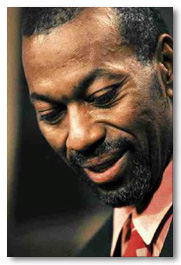The Subway Hero
- CHARLES COLSON
On the day after New Years, as most of the world now knows, Wesley Autrey, a construction worker and a Navy veteran, was waiting for the train with his two daughters at the 137th Street Station in New York.
 |
Wesley Autrey
|
Autrey jumped onto the tracks, risking his own life, to save the stricken stranger. After visiting the man in the hospital, Autrey, who denied that he had done anything “spectacular,” went to work.
While Autrey didn’t think that his actions were spectacular, other people did. At a time when most of the news is disheartening, Autrey’s actions inspired millions of people. Americans have become jaundiced and skeptical. We need heroes every now and then, a role model — and that’s what Autrey has become.
Not only did he inspire us, but he also helps remind us of some important truths about being human.
One of these is that materialism can never provide a satisfactory, much less complete, account of human nature. While neo-Darwinism offers a superficial explanation for human evil, it can’t begin to account for human goodness, such as Autrey’s actions.
What we Christians call “altruism,” Neo-Darwinists call “enlightened” selfishness. Thus, a Neo-Darwinist would say that parents care for their children and siblings as a way of ensuring that their “selfish genes” get passed on to the next generation.
Even if this were true, it says nothing about why a man jumps in front of an incoming train for a total stranger, as Autrey did. For that, you need the capacity for self-sacrifice, an utterly un-Darwinian trait.
Autrey’s actions also reminded of what true virtue looks like. As Scott Carson, a philosophy professor at Miami of Ohio, pointed out, people like Autrey nearly always deny that what they did was “spectacular.”
This is more than modesty; it’s what C. S. Lewis meant when he wrote that virtue is “precognitive.” A soldier in a foxhole who jumps on a grenade doesn’t ponder the issues; he acts on instinct: that instinct being the product of believing the right things and living that way — what philosophers call “habituation,” or character. As Autrey himself acknowledged after the fact, his actions seemed a bit foolish. But, happily for the stricken man, virtue always doesn’t work in rational ways.
Autrey’s story reminded me of the great Christian leader of the Czech revolution in 1989, Father Václav Maly. When I met him in 1990 in Prague and told him what a hero he was to me, he stopped and said, “Oh, no, Chuck. I was just doing my duty.”
Few of us will ever have to demonstrate what Carson calls “the extraordinary virtue of ordinary people” in such spectacular ways. But all of us can aspire to live in a way that will make our “split-second decisions” just as virtuous and praiseworthy.
For further reading and information:
Cara Buckley, “Man Is Rescued by Stranger on Subway Tracks,” New York Times, 3 January 2007.
Scott Carson, “The Extraordinary Virtue of Ordinary People,” An Examined Life, 3 January 2007.
Rick Hampson, “New York Cheers Subway Rescuer,” USA Today, 4 January 2007.
Catherina Hurlburt, “Would You Do This?” The Point, 3 January 2007.
Andrew Strickler, “Good Samaritan Saves Man on Subway Tracks,” Newsday, 2 January 2007.
“New York (!) Named Politest City in the World,” MSNBC, 21 June 2006.
Jim Tonkowich, “Heroism Rediscovered,” BreakPoint WorldView, September 2002.
BreakPoint Commentary No. 020910, “Rediscovering Heroes: Greatness among Us.”
BreakPoint Commentary No. 061128, “The War of All against All: Evolution and Altruism.”
Regis Nicoll, “Materialism’s Unsolved Mystery: The Question of Altruism,” BreakPoint Online, 23 June 2006.
 This is Meaghen Gonzalez, Editor of CERC. I hope you appreciated this piece. We curate these articles especially for believers like you.
This is Meaghen Gonzalez, Editor of CERC. I hope you appreciated this piece. We curate these articles especially for believers like you.
Please show your appreciation by making a $3 donation. CERC is entirely reader supported.

Acknowledgement
Charles Colson. "The Subway Hero." BreakPoint Commentary January 11, 2007.
The Author

 Charles Colson (1931-2012) was an Evangelical Christian leader who founded Prison Fellowship and Breakpoint. Prison Fellowship has flourished into a U.S. ministry of 50,000 volunteers and has spread to more then 50 countries. Beyond his prison ministry, Colson was a Christian author, speaker, and commentator, who regularly confronted contemporary values from a biblically informed perspective. He wrote 15 books, including The Faith: Given Once, For All What Christians Believe, Why They Believe It, and Why It Matters, God & Government, Loving God, Answers to Your Kids' Questions, The Line Between Right & Wrong: Developing a Personal Code of Ethics, Against the Night: Living in the New Dark Ages, and How Now Shall We Live: A Study Guide.
Charles Colson (1931-2012) was an Evangelical Christian leader who founded Prison Fellowship and Breakpoint. Prison Fellowship has flourished into a U.S. ministry of 50,000 volunteers and has spread to more then 50 countries. Beyond his prison ministry, Colson was a Christian author, speaker, and commentator, who regularly confronted contemporary values from a biblically informed perspective. He wrote 15 books, including The Faith: Given Once, For All What Christians Believe, Why They Believe It, and Why It Matters, God & Government, Loving God, Answers to Your Kids' Questions, The Line Between Right & Wrong: Developing a Personal Code of Ethics, Against the Night: Living in the New Dark Ages, and How Now Shall We Live: A Study Guide.


